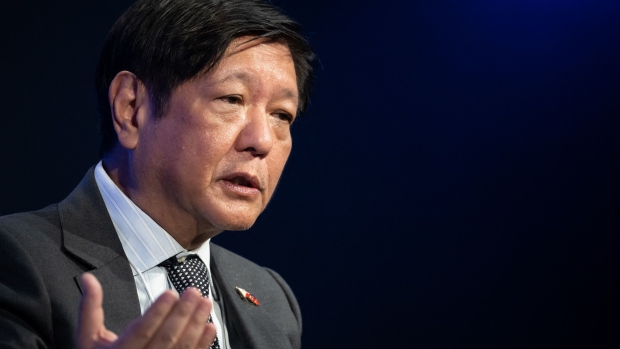Feb 8, 2023
US Allies Japan, Philippines to Boost Ties Amid China Concerns
, Bloomberg News

(Bloomberg) -- Philippine President Ferdinand Marcos Jr. and Japanese Prime Minister Fumio Kishida oversaw agreements bolstering military and infrastructure ties between the two US allies amid China’s growing power in the region.
During the first visit by Marcos to Tokyo since taking office, the two governments signed seven deals, including one aimed at making easier for Japan’s Self-Defense Forces to take part in humanitarian operations in the Philippines, according to the Ministry of Foreign Affairs. During the meeting Thursday, they also agreed on loans for portions of a commuter railway on the Philippines’ main island.
Kishida said he welcomed the defense deal, adding: “We will continue to consider strengthening cooperation between Japan, the US and the Philippines on equipment and technology.” He added that they would also consider a framework to strengthen and facilitate joint training.
The visit marks the latest step in Tokyo’s efforts to build defense ties with partners beyond the US, its only formal treaty ally. It comes a week after the Philippines announced it would allow the US access to more of its military bases.
Kishida said he had explained his nation’s new national security strategy and Marcos had welcomed Japan’s commitment to a “free and open rules-based international order.” Marcos meanwhile described Japan as “one of the Philippines’ closest neighbors and closest friends.”
Earlier Thursday, Marcos met with executives of Japanese firms, and secured investment pledges in semi-conductors and electronics worth billions of pesos, his communications office said, without specifying the amount. These companies include Japan Aviation Electronics Industry, Ltd., Seiko Epson Corporation and Sumitomo Electric Industries, Ltd.
Both nations are grappling with tensions with China. Japan called Beijing an “unprecedented strategic challenge” in a new national security document, while embarking on a historic defense upgrade.
Manila and Tokyo are each locked in territorial disputes with China in the South China Sea and the East China Sea respectively and anxious to maintain stability in neighboring Taiwan, which Beijing sees as part of its territory. Chinese ships have regularly been seen trailing Philippine fishing vessels, often intercepting them and forcing them to divert from contested areas.
Tokyo and Manila also have deep economic links, with Japan being the Philippines’ second-largest trading partner and the only country with which the Southeast Asian nation has a bilateral free trade agreement.
Marcos said Wednesday he hopes to boost cooperation with Japan in ensuring freedom of passage in the South China Sea, as well as to move infrastructure projects delayed by the pandemic.
“Japan is different from the other places that we’ve been wherein we just opened up the conversations. In Japan, our interactions are already very well-developed,” the Philippine leader told reporters, according to an official transcript.
--With assistance from Ryotaro Nakamaru.
(Adds comments following summit.)
©2023 Bloomberg L.P.





